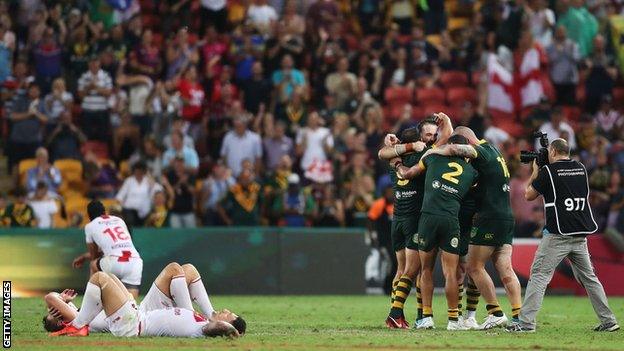Rugby League World Cup: What are the key questions with one year to go?
- Published
One year to go until the Rugby League World Cup
The coronavirus pandemic has caused much uncertainty in sport - and, indeed, life - but preparations for events that are still scheduled must continue.
Friday marks one year to go until the start of the Rugby League World Cup, when hosts England face Samoa at St James' Park.
The men's, women's and wheelchair events will be staged simultaneously for the first time, and organisers remain full of "hope and optimism" despite a number of obstacles to overcome.
BBC Sport spoke to RLWC chief executive Jon Dutton and England international Sam Tomkins to explore the key questions surrounding the tournament.
Will the tournament still take place?
The most important question.
Dutton said: "I feel incredibly positive the tournament will happen in 12 months' time and I am utterly realistic about the challenges we face.
"We have such a desire from people, including the UK government, that the tournament happens."
With the coronavirus pandemic evolving on a daily basis, four scenarios are being planned for:
One: A tournament staged in full.
This would be in front of a total of 750,000 spectators, including 52,000 on the opening day at St James' Park and 74,000 for the finals at Old Trafford.
Two: A socially distanced tournament.
Different models are being worked on, from 25% capacity up to about 50%. This is not something organisers can control, and would be dictated to them depending on circumstances.
Three: Postponing for a year.
This would mean the tournament taking place on the same dates but in 2022. That would take it into another busy year of sport, with the Commonwealth Games, women's football Euros and men's Fifa World Cup taking place.
Four: Cancellation.
The worst-case scenario, which Dutton said "no-one is talking about".
He added: "We have to look at what the world looks like. We will control everything that we can but regarding the environment and the circumstances, we just have to be calm, rational and agile and adapt to those."
What's the latest on tickets - and fans?

Hosts Australia beat England 6-0 in a closely fought 2017 final
Following the pre-sale, priority access window - which exceeded expectations - the ballot for tickets opens on Friday.
Whether any ticket-holders are able to attend remains to be seen but organisers will be able to take learnings from football's European Championship and the Olympic Games in Tokyo, which take place earlier in 2021.
The Challenge Cup final has already taken place without spectators, and the same is expected for the Super League Grand Final at the end of November.
So what it is like for a player to participate in games behind closed doors?
Tomkins, who plays for Catalans Dragons, said: "Watching the Challenge Cup final without fans was just bizarre. At the end of the game, the Leeds players celebrated their win but the backdrop was just empty seats. It was very strange.
"It would be a massive shame to not have fans. All the memorable shots from big games in the past, whether it be Grand Finals, Challenge Cup finals or World Cups, you see the crowd and feel that - it adds to everything.
"Games are remembered as much as what happens on the field as the support of the fans in the stands."
Dutton said: "We have a number of contingencies and we just have to work through those in the new year. We are confident we can do this with full stadia but if we cannot do that then we can look at the other options.
"I cannot envisage playing this tournament behind closed doors but who knows where we might be in a few weeks' time."
How can I follow the matches?
A total of 61 games shown live on BBC One or BBC Two, with highlights shows in the evening and coverage across BBC Sport online and BBC Radio 5 Live and Sports Extra.
There are 18 host towns and cites, with the tournaments kicking off on 23 October 2021 as England take on Samoa in Newcastle, and the men's and women's finals taking place at Old Trafford on 27 November.
England, Scotland and Wales have all qualified for the men's event, as have Ireland, with the Cook Island and Greece appearing in the tournament for the first time.
The Women's World Cup will feature eight teams, with England hosting Brazil in the opener on 9 November.
The Wheelchair World Cup, which also has eight teams, runs from 11-26 November, with the final at Liverpool's M&S Bank Arena.
Why are they playing three tournaments at once?
"The very essence of what we are trying to do is bring people together and creating memories," said Dutton.
"We have defined ourselves as a tournament with a purpose and have delivered against a plan so far.
"Our main focus up to now has been our social impact programme and genuinely making a difference in local communities that we serve."
What do the group stages look like?
Men's draw
Group A: England, Samoa, France, Greece
Group B: Australia, Fiji, Scotland, Italy
Group C: New Zealand, Lebanon, Jamaica, Ireland
Group D: Tonga, Papua New Guinea, Wales, Cook Islands
Women's draw
Group A: England, Papua New Guinea, Canada, Brazil
Group B: Australia, New Zealand, France, Cook Islands
Wheelchair draw
Group A: England, Australia, Spain, Norway
Group B: France, Wales, Scotland, USA